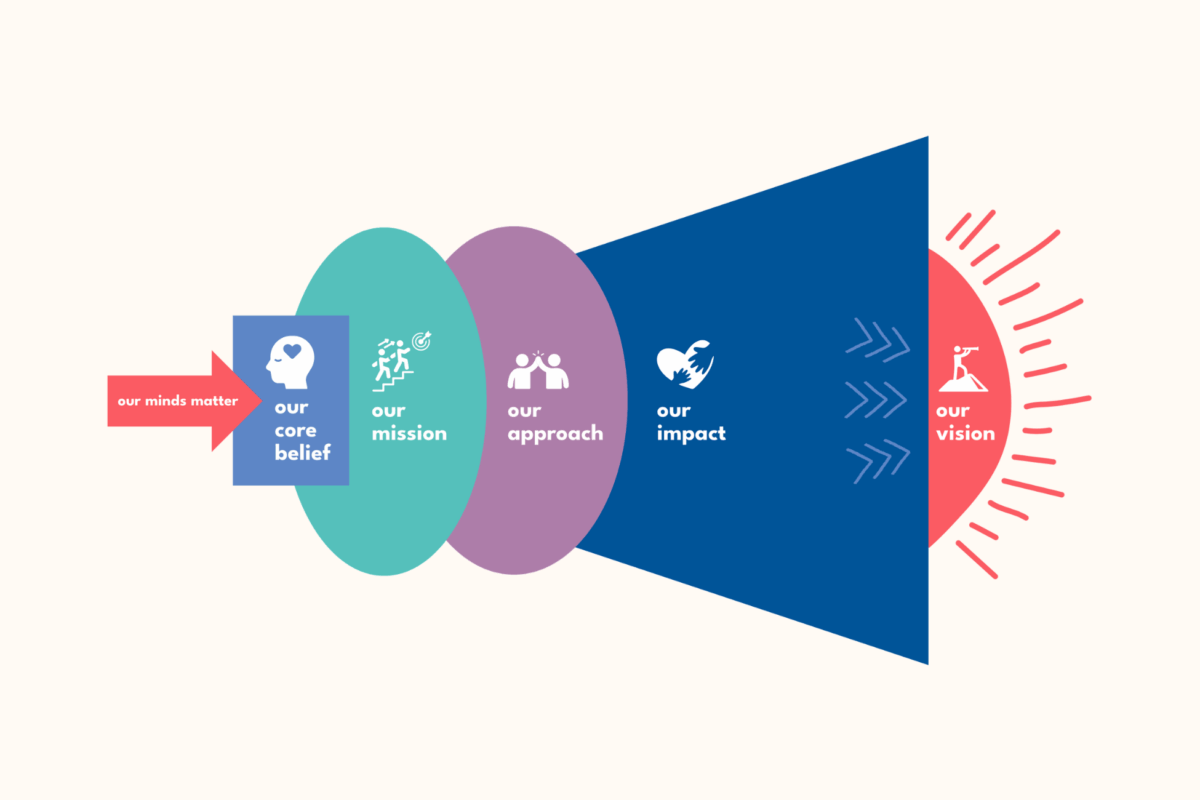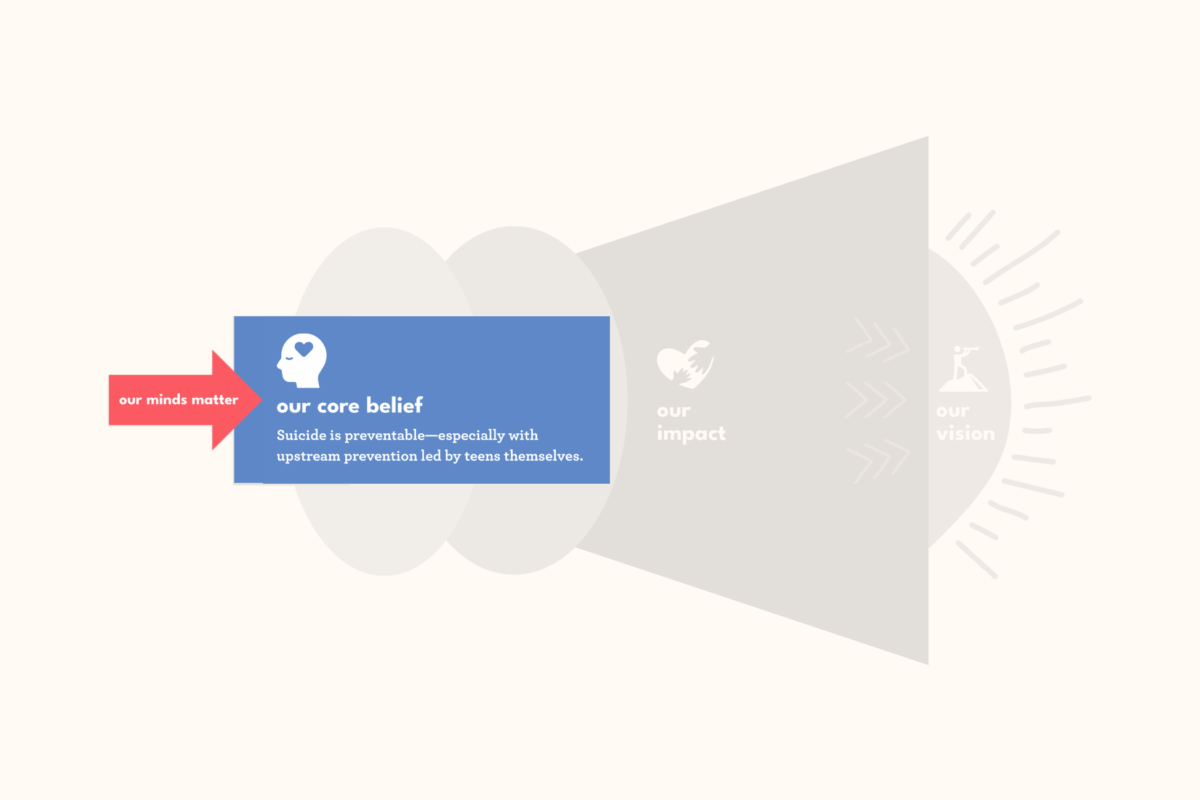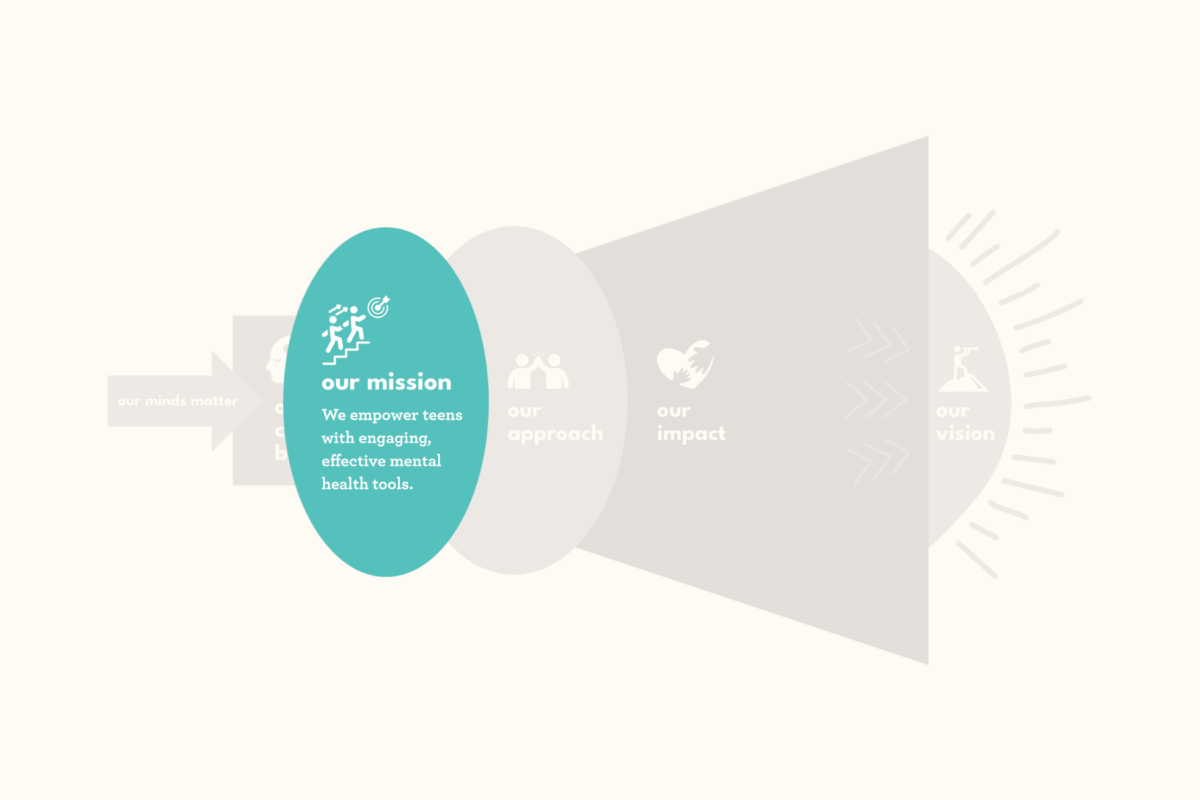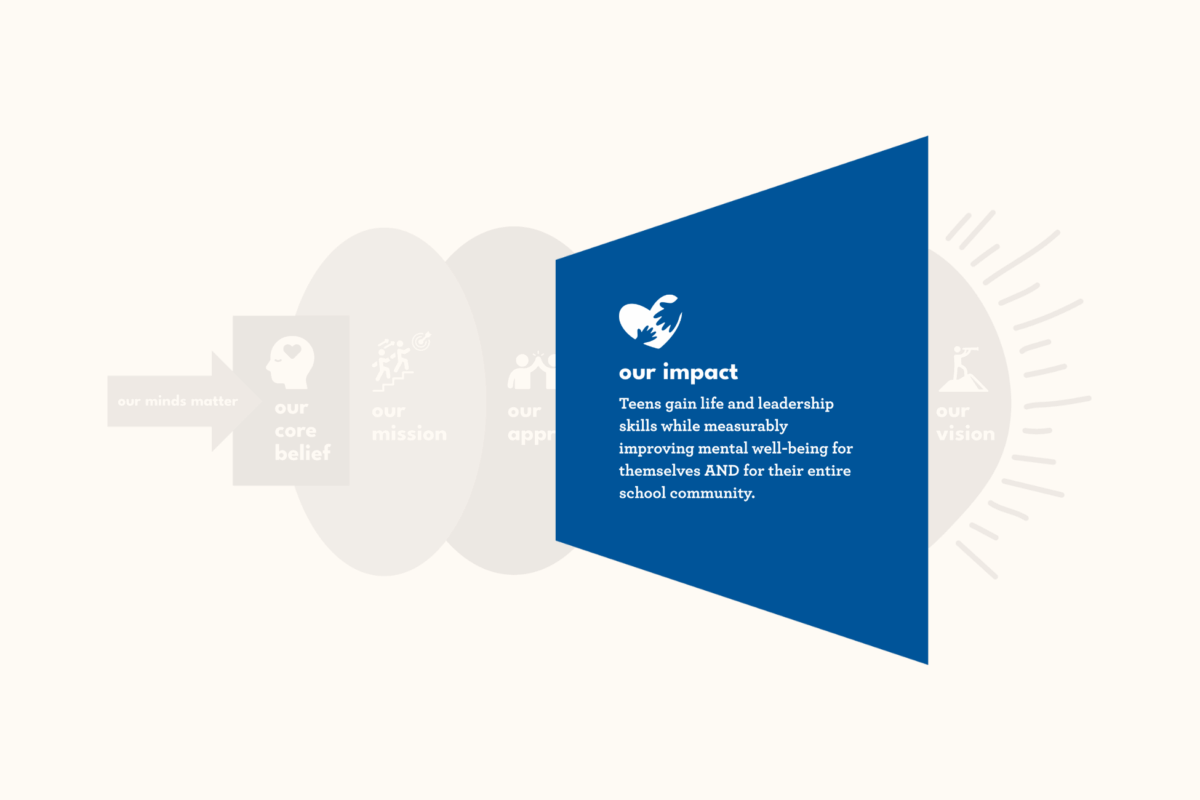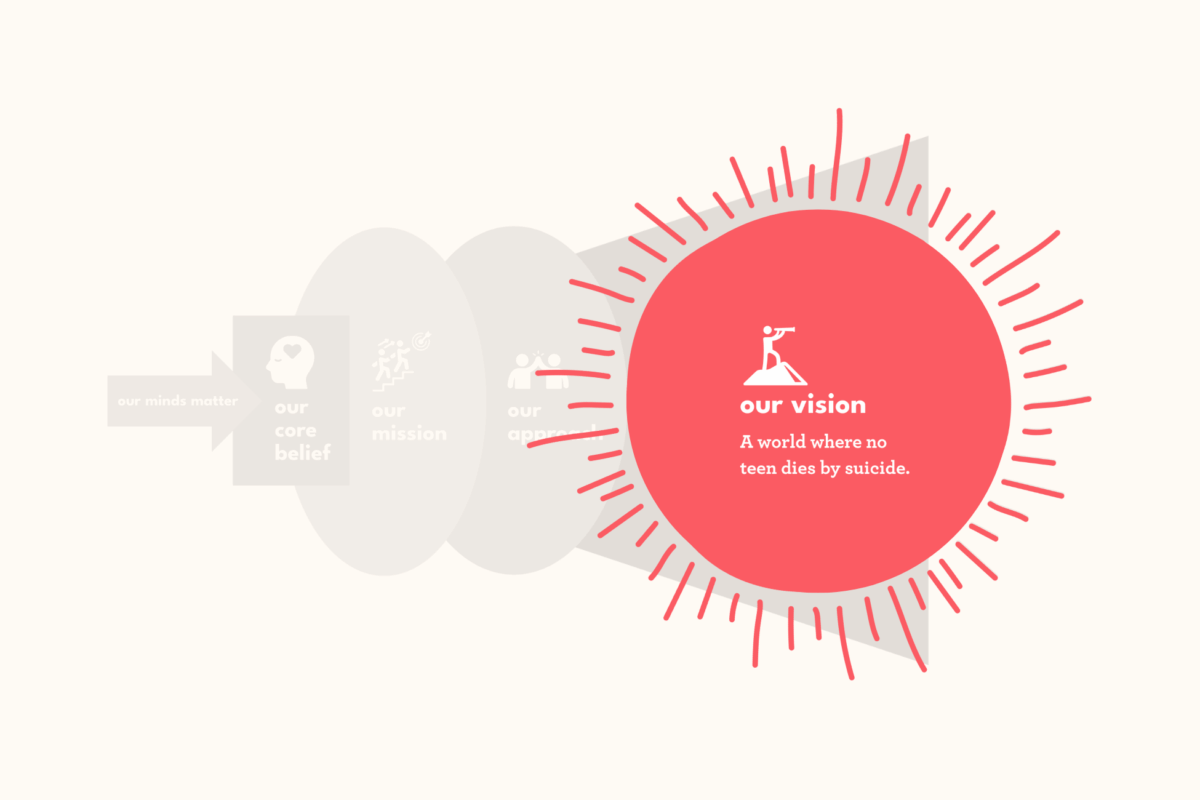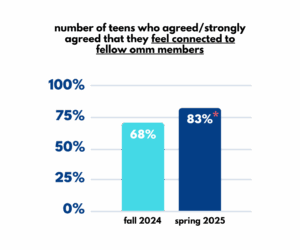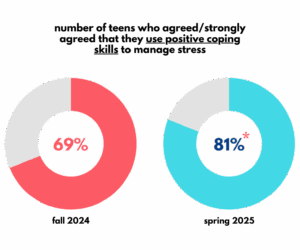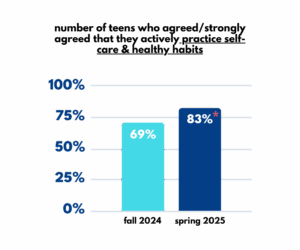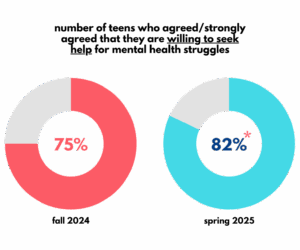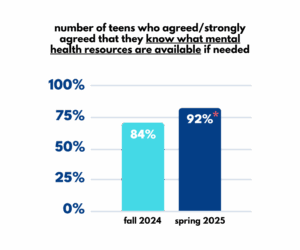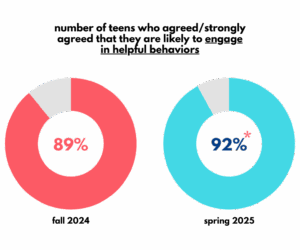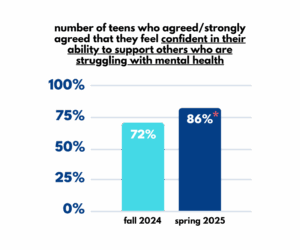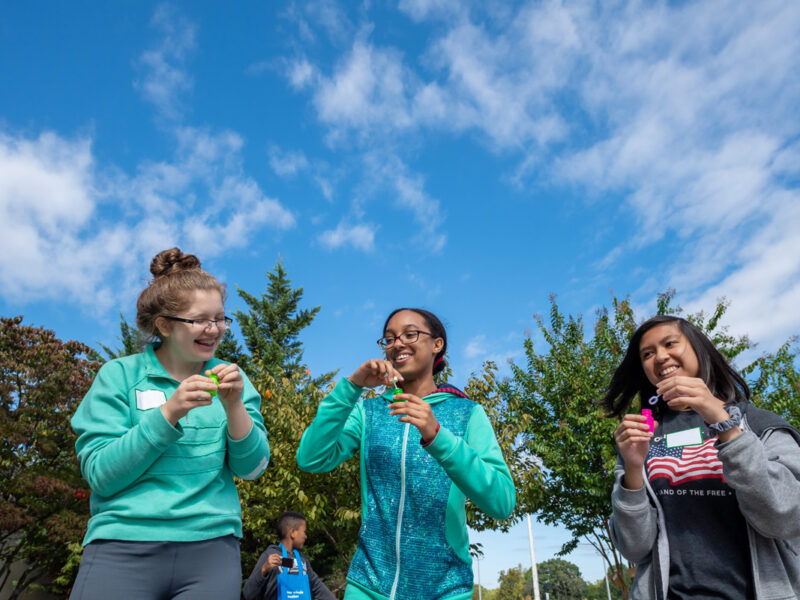

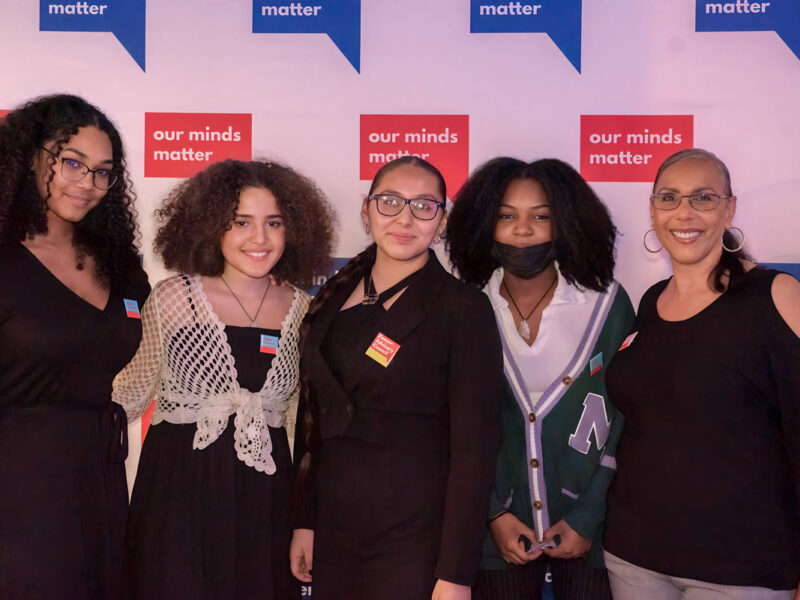
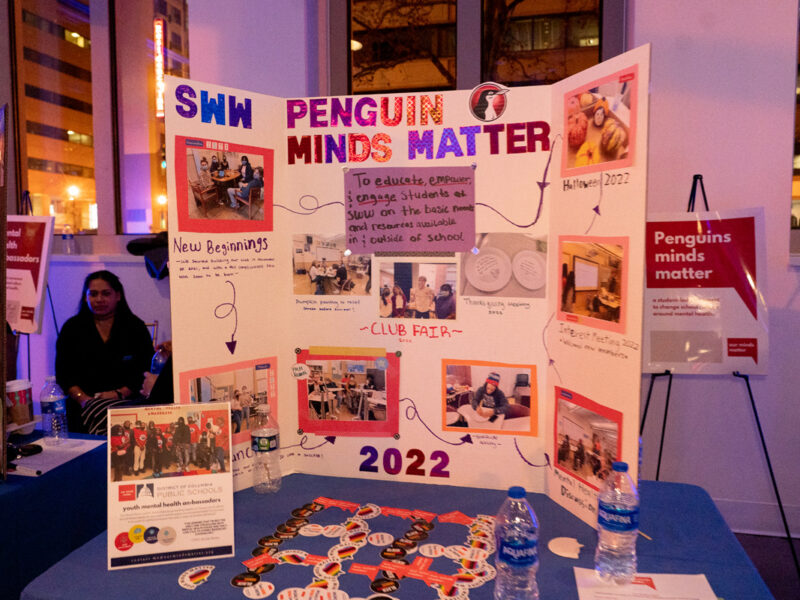

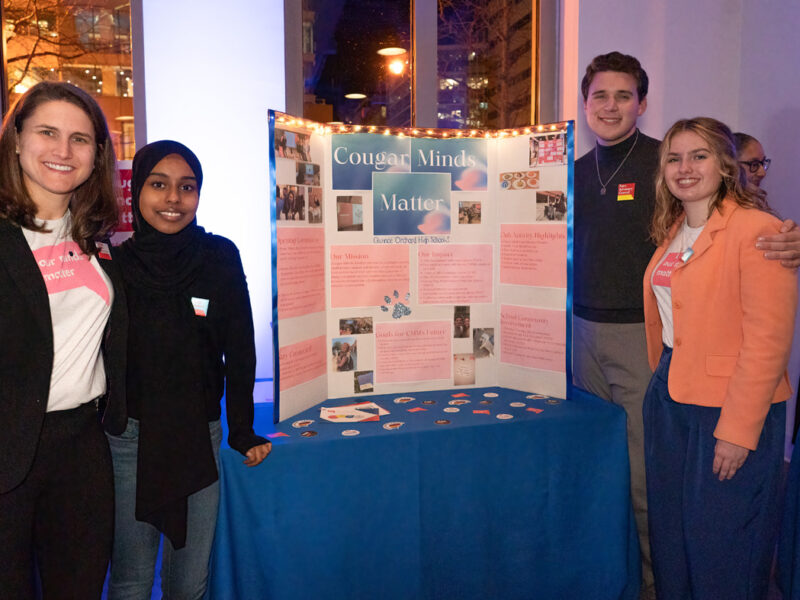
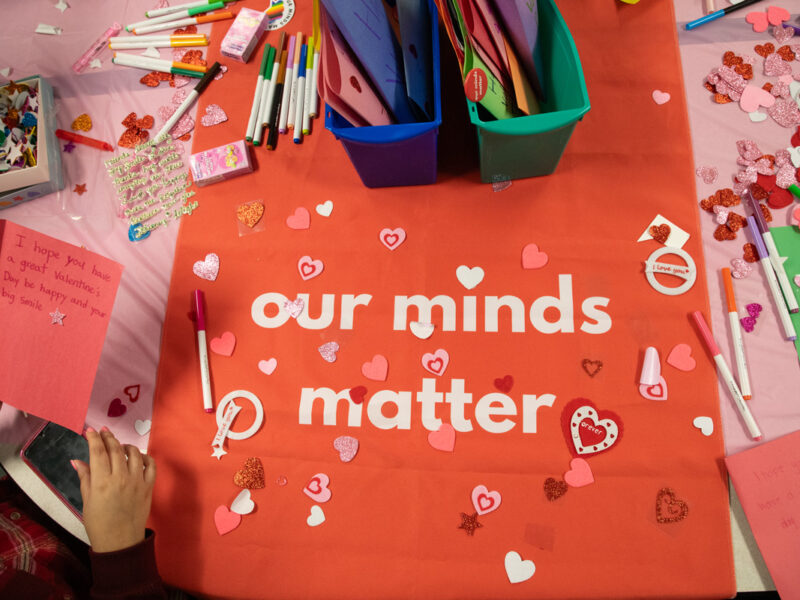
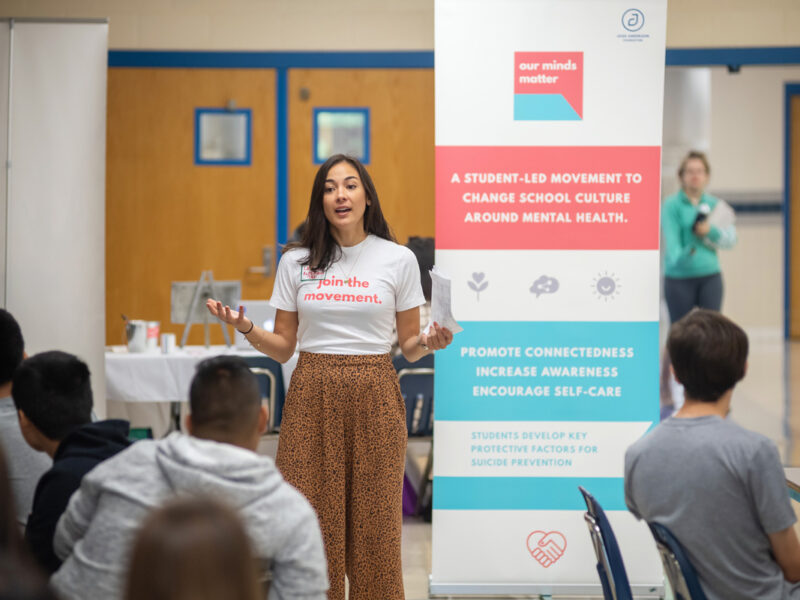
Data-Driven & Evidence-Informed
At Our Minds Matter, we ground our work in data, evidence, and heart. Every data point represents a teen, a community, a life – and guides us to continually improve. Through evaluation and research, we ensure our programs reflect best practices in teen suicide prevention and create meaningful impact for the communities we serve.
“We have been able to reach out to a number people to form a close-knit community that supports positivity and friendship."
— OMM Club Member
“The campaigns have been very unifying and great ways to bring our various leadership groups/clubs together around a shared purpose.”
— OMM Club Member
"The OMM club has empowered students to look out for one another and advocate for a more compassionate and inclusive environment where everyone feels seen, heard, and valued.”
— OMM Club Member
“It has helped me believe in ME.”
— OMM Club Member
“Being part of a community that encourages mindfulness, reflection, and open conversation has helped me feel more grounded during stressful times.”
— OMM Club Member
“This club inspired me to pursue a career in clinical psychology. It also inspired me to start therapy which led to significant growth.”
— OMM Club Member
“It has made me feel as though I have a place where I can share my thoughts openly and without judgment. It has also helped me develop positive coping methods to help with my mental health.”
— OMM Club Member
“The OMM club has significantly strengthened our school’s mental health culture by creating a safe, supportive space for open conversations about mental health."
— OMM Club Member
Data is the heartbeat of our work
Reminding us that behind every number is a life we can help change
What We Measure
Protective Factors: Consistent with our upstream prevention approach, our program focuses on building protective factors among teens – key indicators shown to reduce suicide risk and promote mental well-being. These include:
- Social connectedness
- Positive coping and self-care/healthy habits
- Help-seeking
- Prosocial skills
Overall Mental Well-Being: As an organization dedicated to elevating teen voice and agency in improving mental health, we are also interested in learning how teens themselves believe their mental health and well-being is impacted by our program.
School -Wide Impact: We also assess how our program impacts entire school communities.
How We Measure
Program Evaluation: Each year, OMM conducts a comprehensive program evaluation to understand the impact of our club-based model. We gather qualitative and quantitative data from multiple stakeholder groups—student leaders, club members, and school staff—to capture both measurable outcomes and the personal experiences behind them, providing a richer, more nuanced view of the impact of our programming. By including perspectives from all stakeholders, we ensure every voice is represented. The insights we gather help us assess how well we are meeting our intended outcomes and guide data-informed decisions that continually strengthen our programs.
Innovative Research: We are dedicated to advancing the evidence base for teen mental health by conducting new and meaningful research. To achieve this, we partner with external researchers to conduct a more in-depth empirical analysis of our program’s impact, helping us ensure that we’re asking the right questions. Additionally, we have conducted a focus group to explore the long-term benefits of club participation and analyze existing data to gain a deeper understanding of OMM’s impact on overall school culture. While some projects are still underway, early findings have already provided valuable insights into how OMM influences the lives of teenagers. Through this ongoing research effort, we aim not only to improve our own programs but also to advance the broader field of teen mental health and suicide prevention.
What We've Learned
Protective Factors
In the 2024-25 school year, our data showed promising outcomes for our participants across high school and middle school clubs.
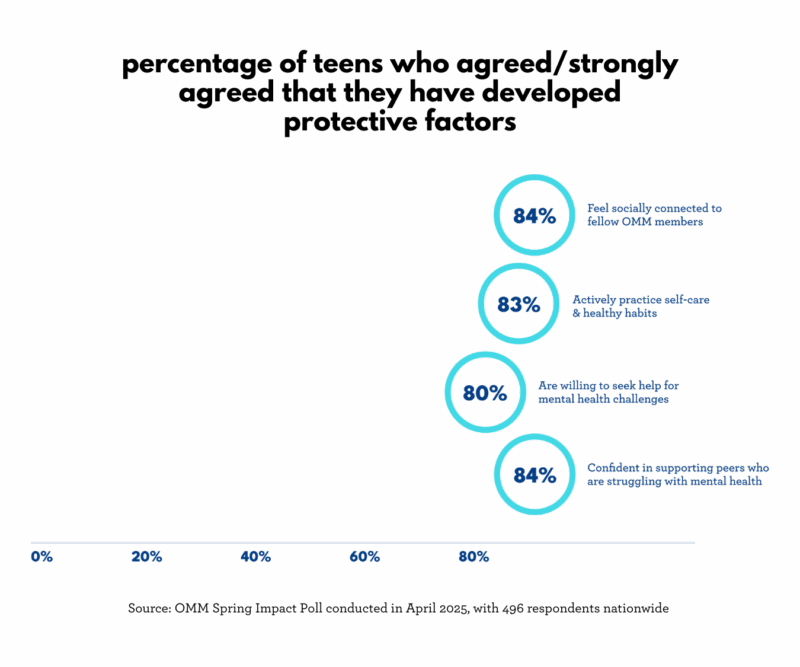
OMM teens overwhelmingly report they have developed protective factors
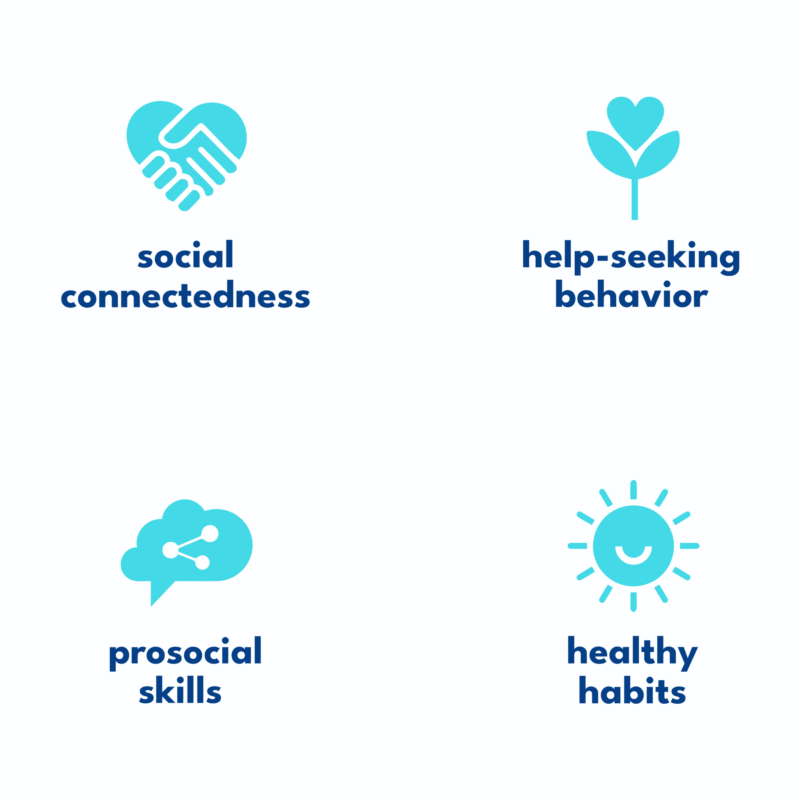
Protective factors improve for teens participating in OMM clubs - even within just one school year
We compared survey data from Fall to Spring for 106 unique participants (while protecting their anonymity) to understand if there was change in protective factors during the course of the school year.
Encouragingly, students from this matched sample consistently reported improvements across all four protective factors and mental well-being, with most increases in average scores showing statistically significant gains.
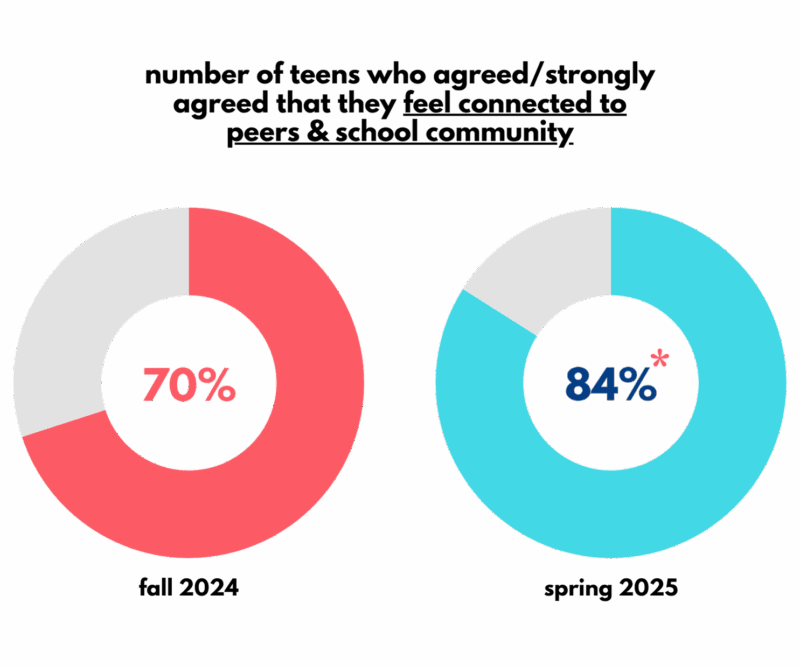
Improvement to Key Protective Factors: Before and After OMM Club Participation
“OMM has made me feel more included and has allowed me to converse more with peers I would not have otherwise talked to. Ultimately, OMM has been a positive influence on my high school experience, especially as a senior.” – OMM Club Member
(*) indicates changes in average scores from pre- (Fall) to post- (Spring) were statistically significant at p=.05
Overall Mental Wellbeing
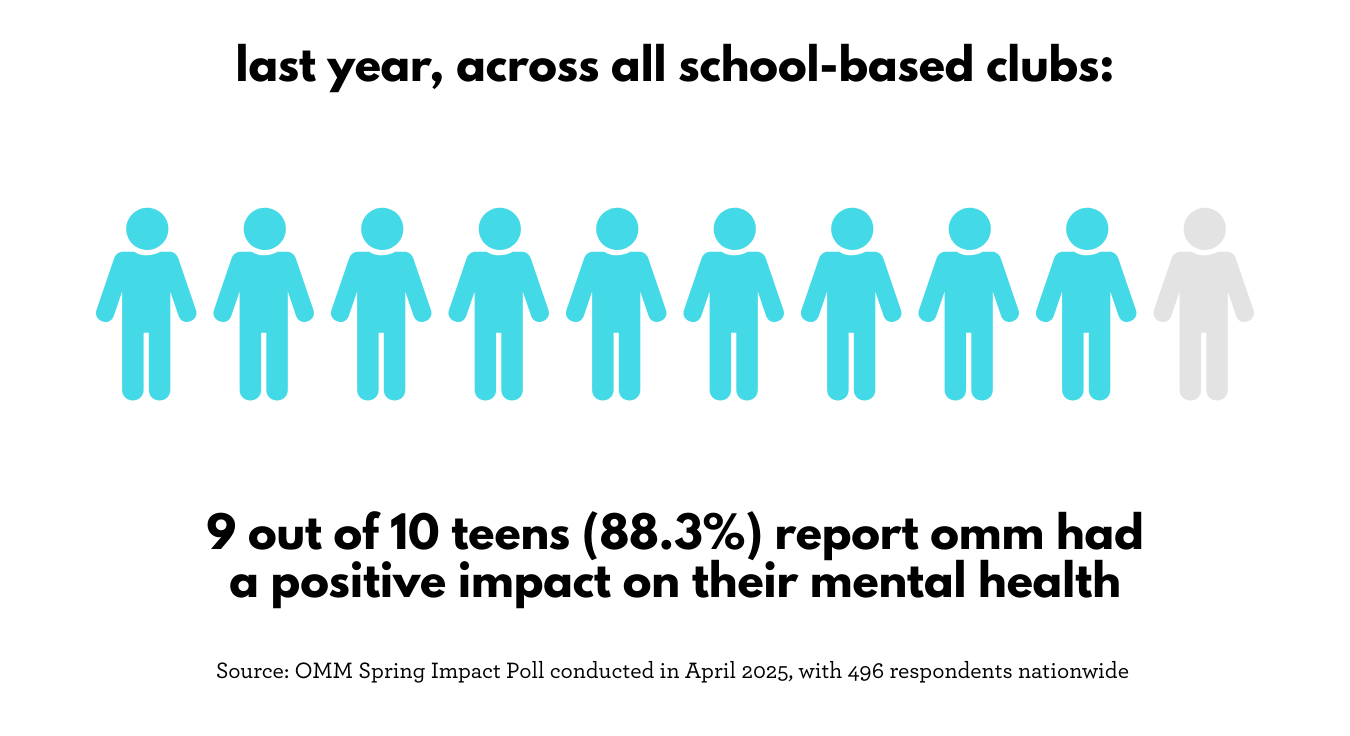
- Students who take on leadership roles see the biggest benefits from their club involvement. Teen leaders consistently outscored club members on all outcome variables, and the mean differences were mostly statistically significant.
- There is evidence that OMM creates safe, affirming spaces for especially vulnerable students, like BIPOC and LGBTQ+ communities. In line with national trends, BIPOC and LGBQ+ students in OMM report slightly lower scores than their counterparts on some outcomes. Still, their sense of social connection with fellow club members and perception of the positive impact on their mental health were just as strong – showing that OMM benefits students across diverse backgrounds equally. These findings highlight the role of OMM clubs as safe, affirming spaces where students with minoritized identities can build belonging, a vital protective factor that buffers mental health challenges and suicide risks.
—OMM Club Member“It has made me feel as though I have a place where I can share my thoughts openly and without judgment.”
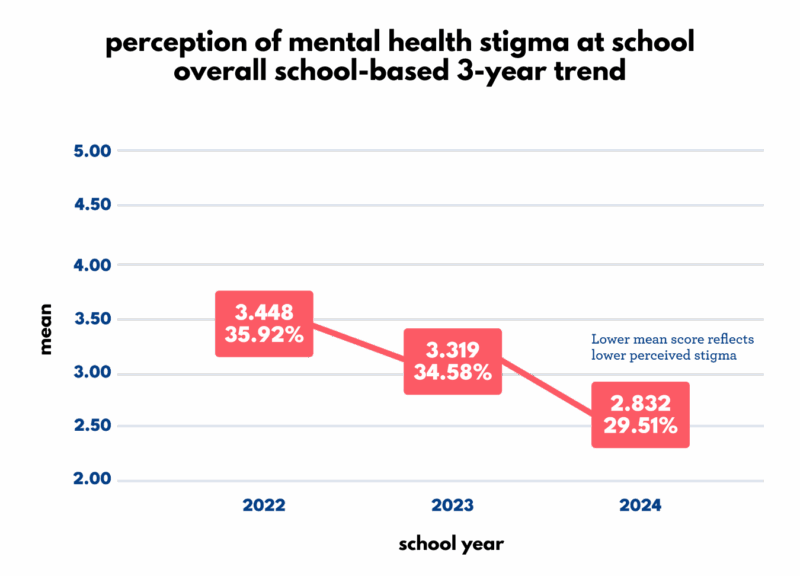
School-Wide Impact
Our data provides clear evidence that OMM is helping shift the culture within school, making mental health the new normal. A recent 3-year trend analysis revealed a steady decline in students’ perceptions of mental health stigma across the entire school, indicating that OMM is creating more spaces for dialogue and support around mental health.
Within the 2024-25 school year, students also report shifts in attitudes and behaviors across multiple measures from the beginning to the end of the school year – such as increased peer support and lower perceived stigma – reflecting a more connected, supportive, and mentally healthy school environment.
In fact, across all school districts and program types, the three most frequently cited words OMM students used to describe their school mental health culture toward the end of the school year were supportive, helpful, and open, which accounted for nearly 20% of the total words reported.
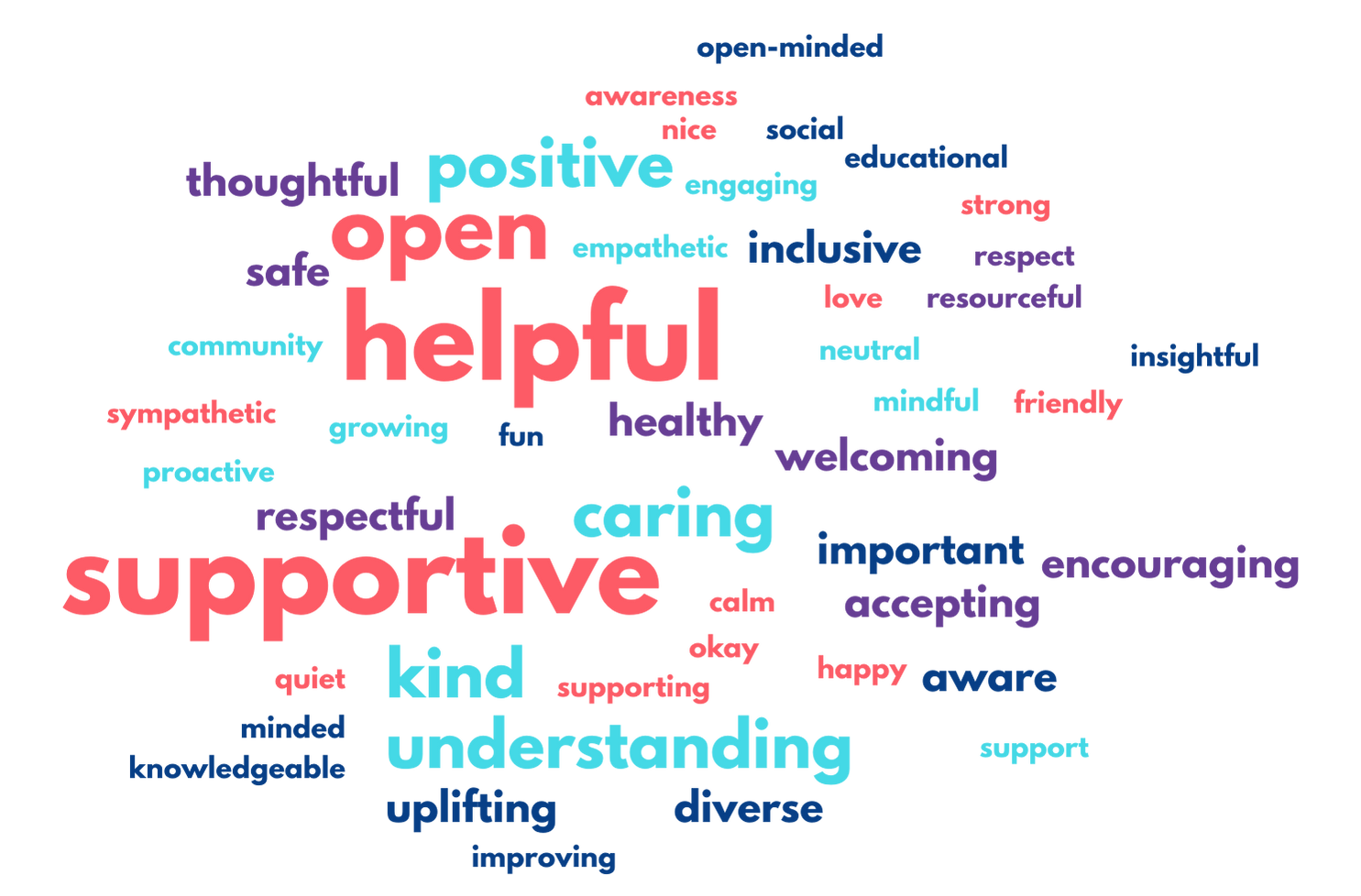
Research Learnings
In this section, we share some of the most exciting findings from our research. From a focus group exploring the long-term benefits of club involvement to research revealing the ripple effects of peer-to-peer programming, our studies demonstrate the real-life impact of our work. Each finding brings us closer to our mission: empowering teens, supporting their peers, and advancing knowledge that can transform and ultimately save lives.
Research Spotlights:
Students involved in OMM clubs reported stronger academic confidence, greater social connectedness with others, and more openness to seeking mental health support. We also found a “ripple effect” of the program, where broader school exposure to OMM programming may benefit the larger student body.
Alumni of Our Minds Matter clubs described involvement with OMM as a transformative experience, citing its role in fostering resilience, emotional intelligence, collaborative leadership, and a lifelong commitment to mental wellness.
More Research Findings:
—OMM club member“The OMM club has empowered students to look out for one another and advocate for a more compassionate and inclusive environment where everyone feels seen, heard, and valued.”
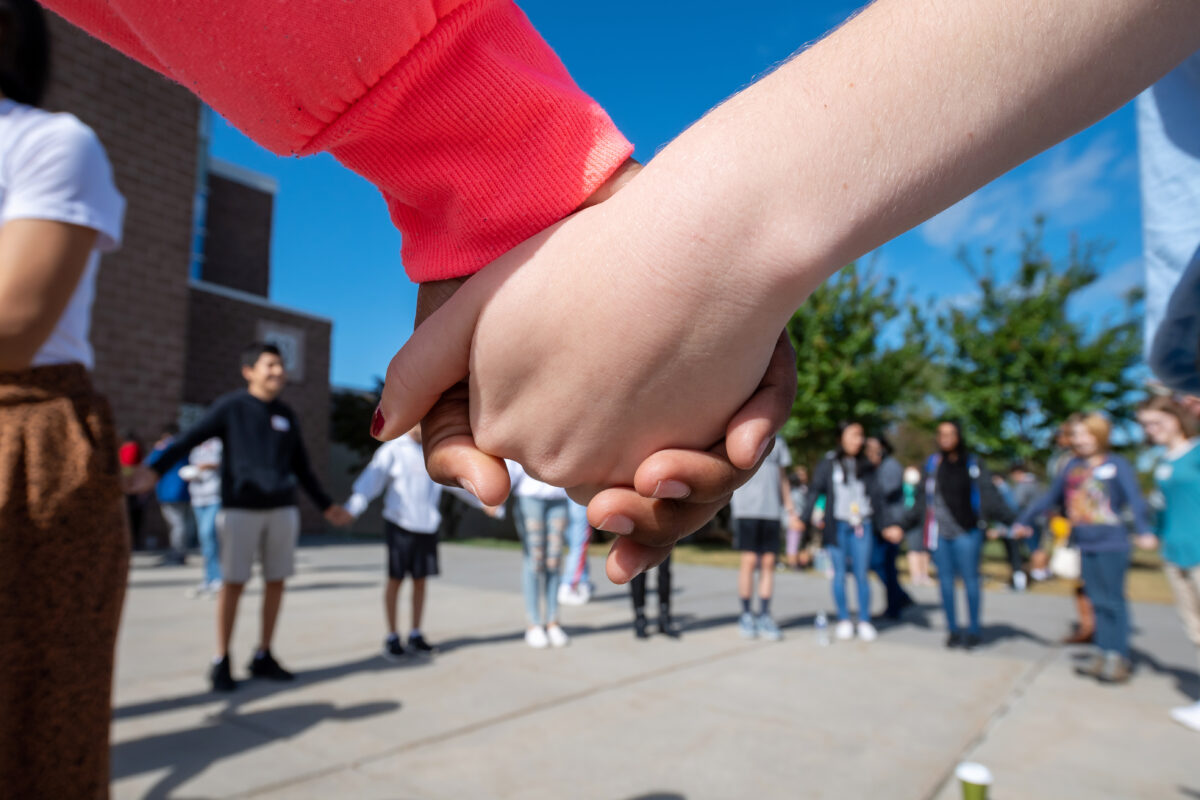
Research Collaborations

Jordan A. Booker, Ph.D.
Associate Professor of the Department of Psychological Sciences, University of Missouri
Current Research Partner
Since 2021, we have partnered with Dr. Jordan Booker from the University of Missouri to research peer-to-peer models in youth suicide prevention programming.
Dr. Booker received his Ph.D. in Developmental Psychology at Virginia Tech and completed postdoctoral training at Emory University.
His research spans topics of emotion, personality, and identity development across adolescence and into early adulthood. He often incorporates autobiographical and family storytelling methodologies to address how people manage emotions, express personality, and build an integrated identity.
Interested in collaborating with Our Minds Matter on your research? We support research efforts that might contribute solutions to the field of youth mental health and suicide prevention.
to be a research partner, you must meet the following requirements:
- Be affiliated with an academic or research institution. This includes obtaining the approval of an Institutional Review Board (IRB) and having a Principal Investigator who is a full-time employee of the institution.
- Knowledgeable in youth development, mental health, and suicide prevention theories and literature.
- Have the technical expertise to work with qualitative and quantitative data.
- Must have a current and completed CITI human subjects research certification.
- Experience working with school districts is preferable but not required
Please reach out to our Director of Impact if you are interested in collaborating with us.
Previous Reports
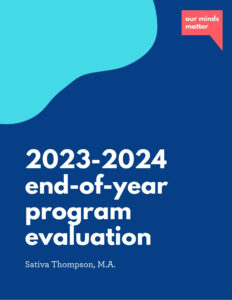
2023-2024 End-of-Year Program Evaluation Results
Sativa Thompson, M.A.
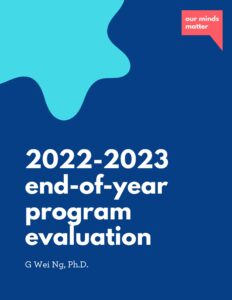
2022-2023 end-of-year program evaluation results
G Wei Ng, Ph.D.
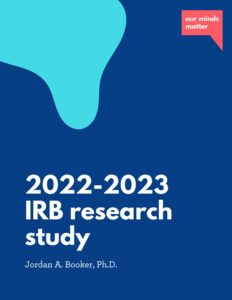
2022-2023 IRB Research Study
G Wei Ng, Ph.D.
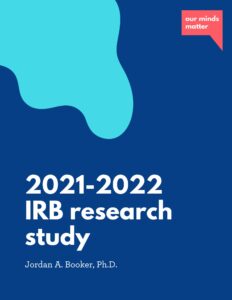
2021-2022 IRB Research Study
Jordan A. Booker, Ph.D.
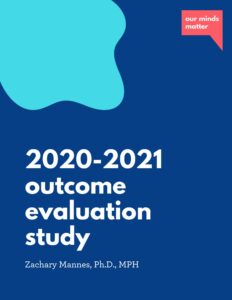
2020-2021 Outcome Evaluation Study
Zachary Mannes, Ph.D., MPH
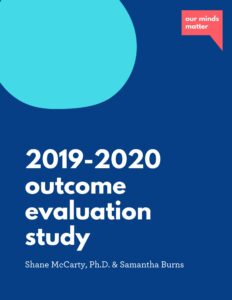
2019-2020 Outcome Evaluation Study
Shane McCarty, Ph.D. & Samantha Burns
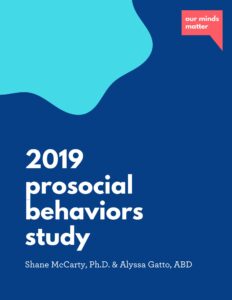
2019 Prosocial Behaviors Study
Shane McCarty, Ph.D. & Alyssa Gatto, ABD
Acknowledgements
Data and research support:
- DCPS Office of Data Systems & Strategy
- MCPS Office of Strategic Initiatives, Applied Research & Evaluation Unit
- FCPS Office of Research & Strategic Improvement
Technical support & contributor:
- Dana McCalla, Ph.D.
Contact Us
Please email our Director of Impact, G Wei Ng, Ph.D., with any questions regarding OMM program evaluation or research.

